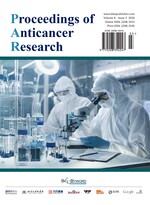Abstract
Tumor protein p53 (TP53) mediates DNA repair and cell proliferation in growing cells. The TP53 gene is a tumor suppressor that regulates the expression of target genes in response to multiple cellular stress factors. Key target genes are involved in crucial cellular events such as DNA repair, cell cycle regulation, apoptosis, metabolism, and senescence. TP53 genetic variants and the activity of the wild-type p53 protein (WT-p53) have been linked to a wide range of tumorigenesis. Various genetic and epigenetic alterations, including germline and somatic mutations, loss of heterozygosity, and DNA methylation, can alter TP53 activity, potentially resulting in cancer initiation and progression. This study was designed to screen three reported mutations in the DNA-binding domain of the p53 protein in breast cancer, to evaluate the relative susceptibility and risk associated with breast cancer in the local population. Genomic DNA was isolated from 30 breast tumor tissues along with controls. Tetra and Tri ARMS PCR were performed to detect mutations in the TP53 coding region. For SNPs c.637C>T and c.733C>T, all analyzed cases were homozygous for the wild-type allele ‘C,’ while for SNP c.745A>G, all cases were homozygous for the wild-type allele ‘A.’ These results indicate no relevance of these three SNPs to cancer progression in our study cohort. Additionally, the findings from whole exon sequencing will help to predict more precise outcomes and assess the importance of TP53 gene mutations in breast cancer patients.
References
Filipova A, Seifrtova M, Mokry J, et al., 2014, Breast Cancer and Cancer Stem Cells: A Mini-Review. Tumori, 100(4): 363–369. https://doi.org/10.1700/1636.17886
Sun YS, Zhao Z, Yang ZN, et al., 2017, Risk Factors and Preventions of Breast Cancer. Int J Biol Sci, 13(11): 1387–1397. https://doi.org/10.7150/ijbs.21635
Giordano SH, 2018, Breast Cancer in Men. N Engl J Med, 378(24): 2311–2320. https://doi.org/10.1056/NEJMra1707939
Giaquinto AN, Miller KD, Tossas KY, et al., 2022, Cancer Statistics for African American/Black People 2022, CA Cancer J Clin, 72(3): 202–229. https://doi.org/10.3322/caac.21718
Freitas AG, Weller M, 2015, Patient Delays and System Delays in Breast Cancer Treatment in Developed and Developing Countries. Cien Saude Colet, 20(10): 3177–3189. https://doi.org/10.1590/1413-812320152010.19692014
Hameed Khaliq I, Mahmood HZ, Sarfraz MD, et al., 2019, Pathways to Care for Patients in Pakistan Experiencing Signs or Symptoms of Breast Cancer. Breast, 46: 40–47. https://doi.org/10.1016/j.breast.2019.04.005
Watkins EJ, 2019, Overview of Breast Cancer. JAAPA, 32(10): 13–17. https://doi.org/10.1097/01.JAA.0000580524.95733.3d
Feng Y, Spezia M, Huang S, et al., 2018, Breast Cancer Development and Progression: Risk Factors, Cancer Stem Cells, Signaling Pathways, Genomics, and Molecular Pathogenesis. Genes Dis, 5(2): 77–106. https://doi.org/10.1016/j.gendis.2018.05.001
Venkitaraman AR, 2019, How do Mutations Affecting the Breast Cancer Genes BRCA1 and BRCA2 Cause Cancer Susceptibility? DNA Repair (Amst), 81: 102668. https://doi.org/10.1016/j.dnarep.2019.102668
Momenimovahed Z, Salehiniya H, 2019, Epidemiological Characteristics of and Risk Factors for Breast Cancer in the World. Breast Cancer (Dove Med Press), 11: 151–164. https://doi.org/10.2147/BCTT.S176070
Antoniou AC, Casadei S, Heikkinen T, et al., 2014, Breast-Cancer Risk in Families with Mutations in PALB2. N Engl J Med, 371(6): 497–506. https://doi.org/10.1056/NEJMoa1400382
Cortez CC, Jones PA, 2008, Chromatin, Cancer and Drug Therapies. Mutat Res, 647(1–2): 44–51. https://doi.org/10.1016/j.mrfmmm.2008.07.006
Jain AK, Barton MC, 2018, p53: Emerging Roles in Stem Cells, Development and Beyond. Development, 145(8): dev158360. https://doi.org/10.1242/dev.158360
Liu Z, Feng C, Li C, et al., 2024, IGF-I Protects Porcine Granulosa Cells from Hypoxia-Induced Apoptosis by Promoting Homologous Recombination Repair Through the PI3K/AKT/E2F8/RAD51 Pathway. FASEB J, 38(1): e23332. https://doi.org/10.1096/fj.202301464R
Muller PA, Vousden KH, 2013, p53 Mutations in Cancer. Nat Cell Biol, 15(1): 2–8. https://doi.org/10.1038/ncb2641
Ungerleider NA, Rao SG, Shahbandi A, et al., 2018, Breast Cancer Survival Predicted by TP53 Mutation Status Differs Markedly Depending on Treatment. Breast Cancer Res, 20(1): 115. https://doi.org/10.1186/s13058-018-1044-5
Zhu J, Sammons MA, Donahue G, et al., 2015, Gain-of-Function p53 Mutants Co-Opt Chromatin Pathways to Drive Cancer Growth. Nature, 525(7568): 206–211. https://doi.org/10.1038/nature15251
Cao W, Chen HD, Yu YW, et al., 2021, Changing Profiles of Cancer Burden Worldwide and in China: A Secondary Analysis of the Global Cancer Statistics 2020. Chin Med J (Engl), 134(7): 783–791. https://doi.org/10.1097/CM9.0000000000001474
Khan NH, Duan SF, Wu DD, et al., 2021, Better Reporting and Awareness Campaigns Needed for Breast Cancer in Pakistani Women. Cancer Manag Res, 13: 2125–2129. https://doi.org/10.2147/CMAR.S270671
Li CI, Moe RE, Daling JR, 2003, Risk of Mortality by Histologic Type of Breast Cancer Among Women Aged 50 to 79 years. Arch Intern Med, 163(18): 2149–2153. https://doi.org/10.1001/archinte.163.18.2149
Leon-Ferre RA, Giridhar KV, Hieken TJ, et al., A Contemporary Review of Male Breast Cancer: Current Evidence and Unanswered Questions. Cancer Metastasis Rev, 37(4): 599–614. https://doi.org/10.1007/s10555-018-9761-x
Hassin O, Oren M, 2023, Drugging p53 in Cancer: One Protein, Many Targets. Nat Rev Drug Discov, 22(2): 127–144. https://doi.org/10.1038/s41573-022-00571-8
Barbosa K, Li S, Adams PD, et al., 2019, The Role of TP53 in Acute Myeloid Leukemia: Challenges and Opportunities. Genes Chromosomes Cancer, 58(12): 875–888. https://doi.org/10.1002/gcc.22796
Yamaguchi M, Murata T, 2020, Extracellular Regucalcin Suppresses Colony Formation and Growth Independent of Tumor Suppressor p53 in Human Mammary Epithelial Cells. Tissue Cell, 67: 101447. https://doi.org/10.1016/j.tice.2020.101447
Aziz I, Rashid MU, Sultan F, et al., 2013, Frequency of Pro Allele on Codon 72 of TP53 in Female Breast Cancer Patients of Pakistan: Molecular Stress or Geography. Pakistan Journal of Zoology, 45(5): 1437–1446.
Breast Cancer Association Consortium, 2021, Breast Cancer Risk Genes – Association Analysis in More than 113,000 Women. N Engl J Med, 384(5): 428–439. https://doi.org/10.1056/NEJMoa1913948
Li N, Deng Y, Zhou L, et al., 2019, Global Burden of Breast Cancer and Attributable Risk Factors in 195 Countries and Territories, from 1990 to 2017: Results from the Global Burden of Disease Study 2017. J Hematol Oncol, 12(1): 140. https://doi.org/10.1186/s13045-019-0828-0
